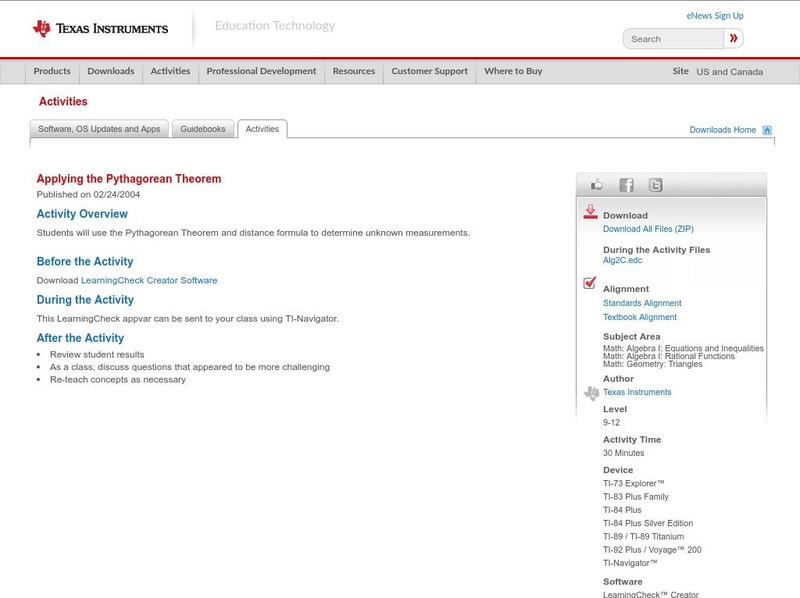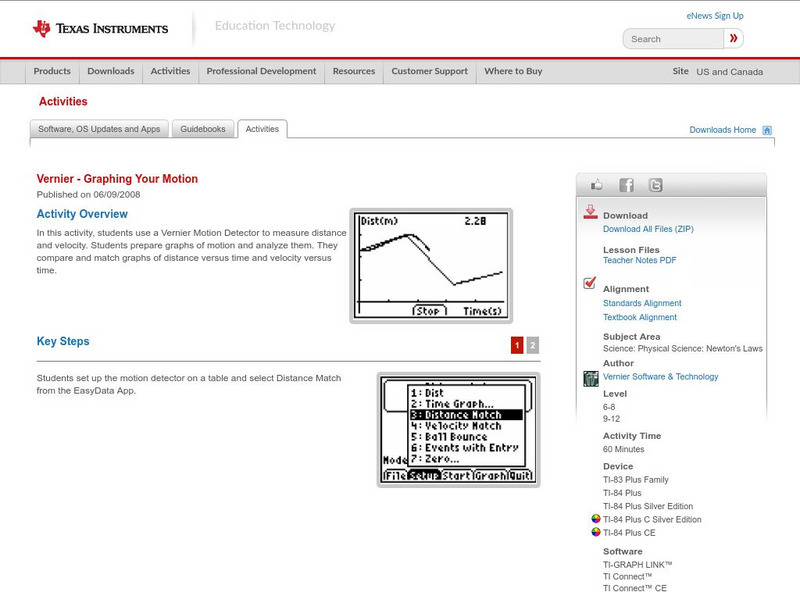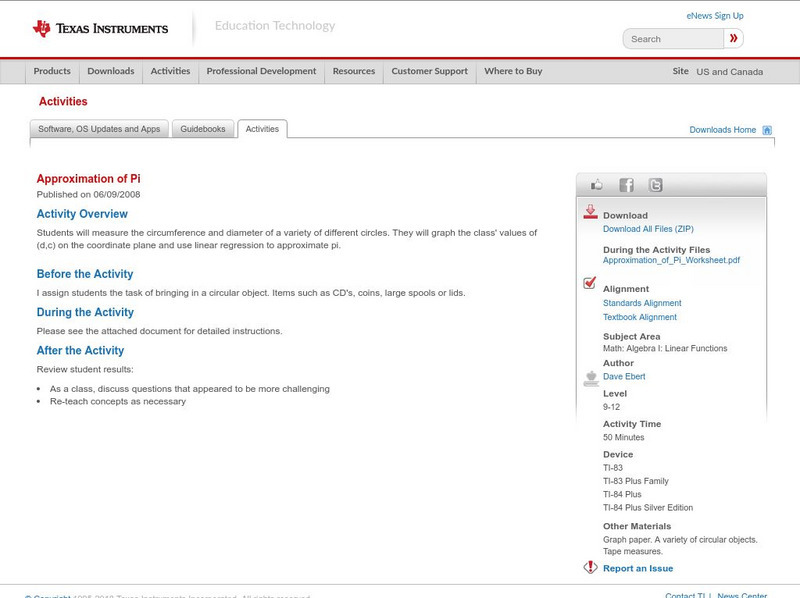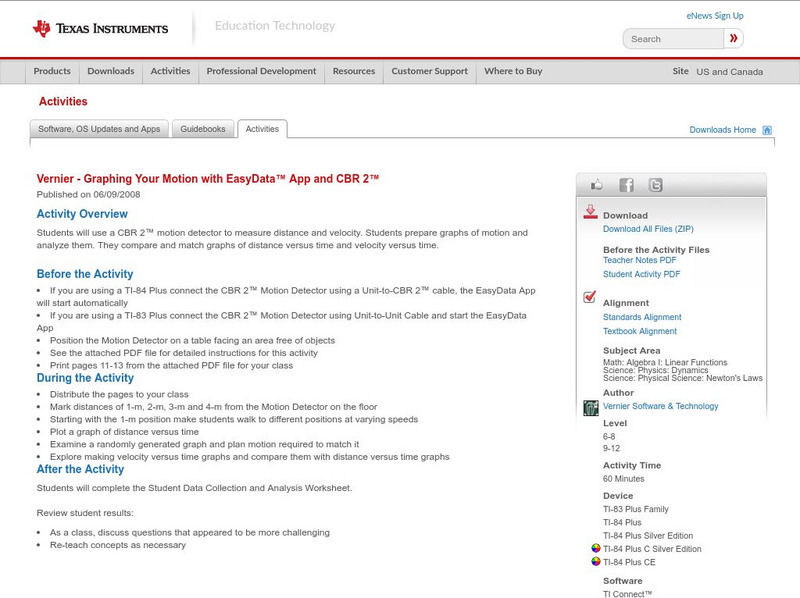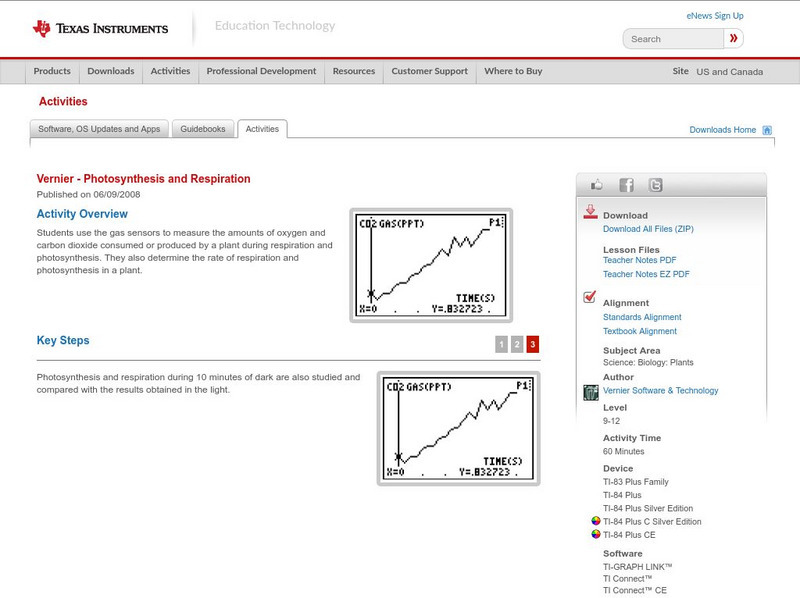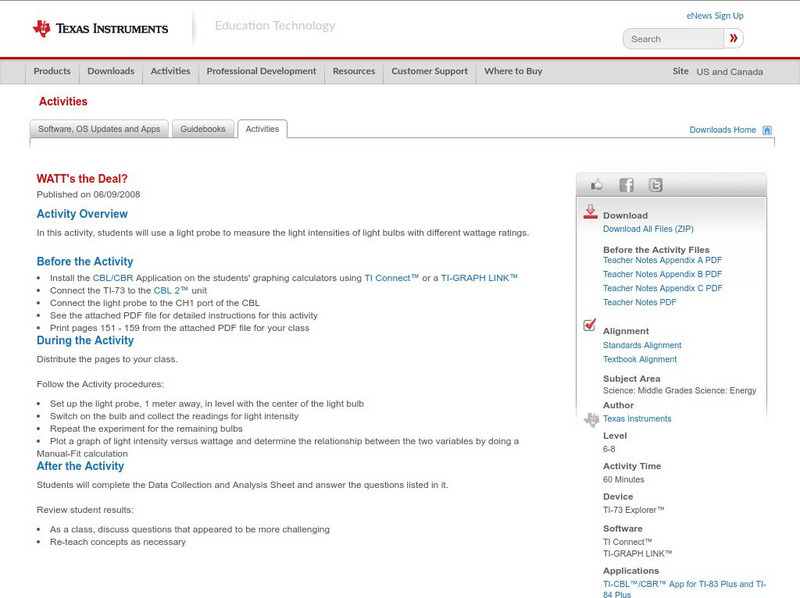Texas Instruments
Texas Instruments: A Tall Story
In this activity, students can use the motion detector to measure their current height and obtain a mean value. They will use this and earlier data to plot a graph of height versus age. Students will identify the mathematical model that...
Texas Instruments
Texas Instruments: The Pythagorean Theorem and Classifying Triangles
Students can use the converse of the Pythagorean Theorem to predict a triangle's classification. The Cabri Jr. App on the TI-83+/84+ family will be used to create triangles and find their measurements. Adobe PDF lab worksheets are included.
Texas Instruments
Texas Instruments: Funnel Volumes: Volume and Weight
In this activity, students' will use a force sensor to measure the weight of a water filled funnel as it drains. They analyze the weight versus time data and describe it using concepts of slope and intercepts of a linear function.
Texas Instruments
Texas Instruments: Grandparents and Special Friends Day
This lesson was designed for our Grandparents and Special Friends day. It can be used for any visitation day, or an open house. The lesson is designed to review percent of a whole and the sector of the circle representing the percentage....
Texas Instruments
Texas Instruments: Math Today the New Color of Money
The USA TODAY Snapshot allows students to use scientific notation with real-life data. Students will work with large numbers when determining the height of a stack of $20 bills. Unit conversion will be used from one unit of measure to...
Texas Instruments
Texas Instruments: Designing Hot and Cold Packs
in this activity, students calculate the molar enthalpy of dissolving for three ionic solids, and use this information to design a cold pack. In this experiment they measure the heat changes which occur from various salts dissolving in...
Texas Instruments
Texas Instruments: How Tall? Describing Data With Statistical Plots
In this activity, students' will measure their heights using a motion detector and describe the data using the statistical concept called box plot.
Texas Instruments
Texas Instruments: Geometric Representation of Trig Functions
Using similar triangles, a relationship is established between the six trigonometric functions of an angle and simple line segments. These relationships are then confirmed using line segment measurement capabilities of the graphing...
Texas Instruments
Texas Instruments: Step Up
Students learn to use measurements on a real model to develop the concept of slope and linear functions. They use a calculator to explore changing the slopes and Y- intercepts in the slope intercept form Y = MX + B.
Texas Instruments
Texas Instruments: How Do Your Errors Grow!
In this activity you will learn how to use the Sig-Fig Calculator. Determine the sig-figs of some measurements and check this work using the Sig-Fig Calculator.
Texas Instruments
Texas Instruments: Real Life Real World Activity Carpentry
Carpenters use applications of geometry in their work, including the properties of right triangles and circles. This activity uses Cabri Jr. Geometry software to make measurements and solve problems based on carpentry situations....
Texas Instruments
Texas Instruments: Get on the Stick
In this activity, students use a CBR 2 to measure the reaction time of catching a stick. They also learn how to interpret a box plot, and make a five number summary of a single variable data set.
Texas Instruments
Texas Instruments: Applying the Pythagorean Theorem
students can use the Pythagorean Theorem and distance formula to determine unknown measurements.
Texas Instruments
Texas Instruments: Graphing Your Motion
In this activity, students use a Motion Detector to measure distance and velocity. Students prepare graphs of motion and analyze them. They compare and match graphs of distance versus time and velocity versus time.
Texas Instruments
Texas Instruments: Reflectivity of Light
In this activity, students can use a Light Sensor to measure reflection values from paper of various colors and compare these values to reflection values of aluminum foil. They will also calculate percent reflectivity.
Texas Instruments
Texas Instruments: Energy From Foods Part Ii
In this activity, students explore how an electrochemical cell works. They use a Voltage Sensor to measure the electrical energy produced when the distance between the electrodes is varied. They also determine the factors that affect the...
Texas Instruments
Texas Instruments: Approximation of Pi
Students will measure the circumference and diameter of a variety of different circles. They will graph the class' values of (d,c) on the coordinate plane and use linear regression to approximate pi.
Texas Instruments
Texas Instruments: Graphing Your Motion With Easy Data App and Cbr 2
Students can use a CBR 2 motion detector to measure distance and velocity. Students prepare graphs of motion and analyze them. They compare and match graphs of distance versus time and velocity versus time.
Texas Instruments
Texas Instruments: Parallel Lines, Transversals and Angles
This activity allows students to: 1. Identify the pairs of angles formed when a transversal intersects two lines.: 2. Measure angles Using Cabri Jr. 3. Identify relationships between pairs of angles when a transversal intersects parallel...
Texas Instruments
Texas Instruments: Photosynthesis and Respiration
Students use the gas sensors to measure the amounts of oxygen and carbon dioxide consumed or produced by a plant during respiration and photosynthesis. They also determine the rate of respiration and photosynthesis in a plant.
Texas Instruments
Texas Instruments: Triangle Inequality Theorem
In this activity, students will explore the concepts underlying the Triangle Inequality Theorem by comparing side lengths and angle measures of a triangle. They will use an interactive construction to see why this theorem is true.
Texas Instruments
Texas Instruments: Holt Physics: Brightness of Light
This probeware version of the Skills Practice Lab Brightness of Light from the chapter Light and Reflection uses a light probe to measure the intensity of light at different distances from a light source.
Texas Instruments
Texas Instruments: Watt's the Deal?
In this activity, students can use a light probe to measure the light intensities of light bulbs with different wattage ratings.
Texas Instruments
Texas Instruments: P H
Students use a pH sensor to measure the pH level of water in a stream or lake. They examine how air pollutants like sulphur dioxide, nitrogen oxides, and carbon dioxide cause acid rain, which affects the pH of water bodies and aquatic...














